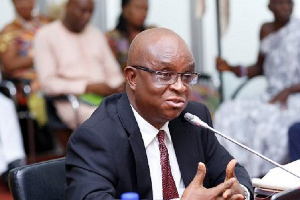Regional News of Saturday, 4 September 2021
Source: GNA
Work on Eastern Corridor road progresses
Work on the Eastern Corridor road, cutting through the Volta and Oti regions towards the north of the country, has resumed in earnest.
The Ghana News Agency (GNA), during a recent tour of the long-envisioned superhighway, witnessed heavy asphalting works on the stretch from Hohoe to Kadjebi, which is being undertaken by Israeli construction company, Rollider.
Speed commute is gradually becoming a reality along a road that has been a nightmare for users, and a major subject of infrastructure development interests over the years.
The government has reorganised some contracts for the construction of the approximately 700 kilometre transnational road, funding for which has also been reviewed and now being sourced from a Sino-hydro financial facility.
Mr. Andrews Nawil, Oti Regional Coordinating Director, said work on the Hohoe to Kadjebi section was at about 70 per cent complete.
“I must assure you that the accessibility from Volta to Oti now is very good. When you pass there, you know that much work has been done and we want to thank the Ministry of Roads and Highways for the gesture, as well as the government.
“We still look for cover for the rest of other areas, but I believe the work done on this section now is very appreciable and we are very appreciative to the government,” he said.
The road from Kpando to Abotoase, which provided an alternative for users avoiding the tumultuous Eastern Corridor, also enjoyed government's attention.
It had fallen to pressure over time, but has been restored to aid traffic flowing from major river enclaves, and which includes heavy carts of root tubers.
The Regional Coordinating Director noted the “tremendous improvements” on the road, and commended First Sky Limited, the contractor, for a “very good” job done.
While work accelerates on the Hohoe to Dodi-Kadjebi sections, the expanse from Nkwanta to Kpassa remains at base level and unmotorable, especially as the area is currently being drenched heavily with rain.
Mr. Jackson Jakayi, Nkwanta North District Chief Executive, told GNA that financial constraints held back the project, but assured the government was working to restore work on the road.
"Seriously speaking, it is a big concern to all of us. Just a couple of weeks ago he brought the asphalting machine and they were working on it and the promise was that just after servicing they were going to do the road. But after that work, it seems because of finance, maybe that is what has kept him waiting.
"Unfortunately for us, the rains have set in again and everything is being washed away. So it is a big concern and it is our prayer that the contractor will come back and all the resources needed to do the work," he said.
Mr. John Thasun, Chief Executive of the Nkwanta South Municipal Assembly, said the roads connecting the Municipality to Kpassa and Dambai remained the only major roads in the region that had never been tarred.
“I want the government to come and do the road. You see that all around, all the roads have been tarred. Only the Kpassa and the Dambai roads have not been tarred so they should come and tar them and we will move freely,” he appealed.
Travel along the corridor also continues to be obstructed in the Volta Region, as the Asikuma to Have portion remains largely undone.
Dr. Archibald Yao Letsa, Volta Regional Minister, confirmed to the Ghana News Agency that First Sky, which has taken over the work from Asikuma to Have, mobilised to the site two weeks ago.
He said Have to Hohoe, in the hands of Chinese firm Green House International, was also progressing.
“The critical part is from Asikuma to Have, which is being tackled now,” the Regional Minister said.
Construction of the highway continues beyond the Oti Region as Government focuses on improving communication lines in the wake of a continental free trade agreement.
The Eastern Corridor, which would connect Tema and Kulungugu on the border with Burkina Faso, is expected to shorten travel time and impact the lives of millions in its vicinity.
Also known as the National Road Two (N2), the road snakes through fertile regions, booming with many of the Nation’s staple foods, and thus the economic fate of thousands of host communities hangs on its completion.
Entertainment










